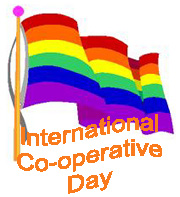口语Festival素材:International Co-operative Day(国际合作节)
文章作者 无名 发表时间 2004:12:06 06:06:16
来源 100Test.Com百考试题网
| International Co-operative Day |
| The first Saturday in July |
 In 1921, at the International Co-operative Congress of World Co-op Leaders wanted to identify and define the growing co-operative movements common values and ideals to help unite co-ops around the world. They decided to hold a special event to celebrate the movements growing diversity. In 1921, at the International Co-operative Congress of World Co-op Leaders wanted to identify and define the growing co-operative movements common values and ideals to help unite co-ops around the world. They decided to hold a special event to celebrate the movements growing diversity.
In Essen, Germany in 1922, ICA (国际合作联盟)leaders made plans for the very first international "Co-operators Day" which was held in July 1923. Since then, on the first Saturday every July, International Co-operative Day has been celebrated. The day is a chance for co-op members and supporters to work together and promote the co-op movements successes and ideals of international solidarity(团结), economic efficiency, equality, and world peace. To celebrate the Centennial(百年纪念)of the International Co-operative Alliance, the United Nations declared in 1995 that the first Saturday of July to be celebrated as the United Nations International Day of Co-operatives and requested all member governments to join with their co-operative movements to celebrate the day. Over several years various national movements were trying to register the Rainbow Flag as a trade mark, seeking ICA help in finding out arguments to prove that the flag is a distinctive(与众不同的、有特色的)symbol, reserved to the co-op movement. For us, co-operators it is, but in fact, it has never been registered as the ICA symbol. After the Basel Congress in 1921, which was the first congress to be held after an interruption of eight years caused by the Great World War and facing the new challenges in Europe, the ICA Executive Committee decided to devote some time to Co-operative Propaganda. The membership had grown dramatically, thus, the idea was to find a point of rally(集合、集会) which would give an identity to movements scattered(分散) from Japan to Canada.
In these troubled times, the ICA President, G.J.D.C. Goedhart, questioned himself on the causes which hinder the development of the co-op movement. He detected three: lack of information among the general public, lack of knowledge among members and finally lack of ideological commitment among managers. "What can be done to remedy (治疗、矫正)these evils? The best means seems to be by general propaganda which must bring to the minds and hearts of outsiders, as in a flash, vivid pictures of the Co-operative Movement, the ideals for which it stands, the real significance of its aims, and how it must necessary give us a much better human society than that in which we live." And already in 1922 the best support for publicity appeared to him to be a film. However, since not many societies could have supported such a financial investment, he suggested childrens books, lantern slides (幻灯片)and other means of visual propaganda such as exhibitions. "Arrangements should also be made to hold a "Propaganda Day" or "Evening" in every country, town and village on the same day in order to draw the attention of the universe to what we are doing, and also to the whole world" A special "Co-operators Day" is necessary for this purpose. You are, therefore, called upon to rally to the Standard of "Each for all, all for each" in a great International Demonstration on the First Saturday in July next, when the first organized attempt will be made to "broadcast" our rejoicings(欢庆), our ideals, our successes, and our determination to pursue them to their ultimate goal. |
相关文章
口语Festival素材:The Newport Folk Festival(纽波特民间艺术节)
口语Festival素材:Oregon Brewers Festival(俄勒冈啤酒节)
口语Festival素材:Kyoto Gion Festival(日本京都祗园祭)
口语Festival素材:Bastille Day(法国国庆日)
口语Festival素材:International Co-operative Day(国际合作节)
口语Festival素材:Pamplola Bull-running Fiesta(西班牙奔牛节)
如何准备雅思口语考试
口语Festival素材:US Independence Day(美国国庆日)
口语Festival素材:Phi Ta Khon Festival(佛诞节)
澳大利亚华人论坛
考好网
日本华人论坛
华人移民留学论坛
英国华人论坛
 The political map, and most
The political map, and most